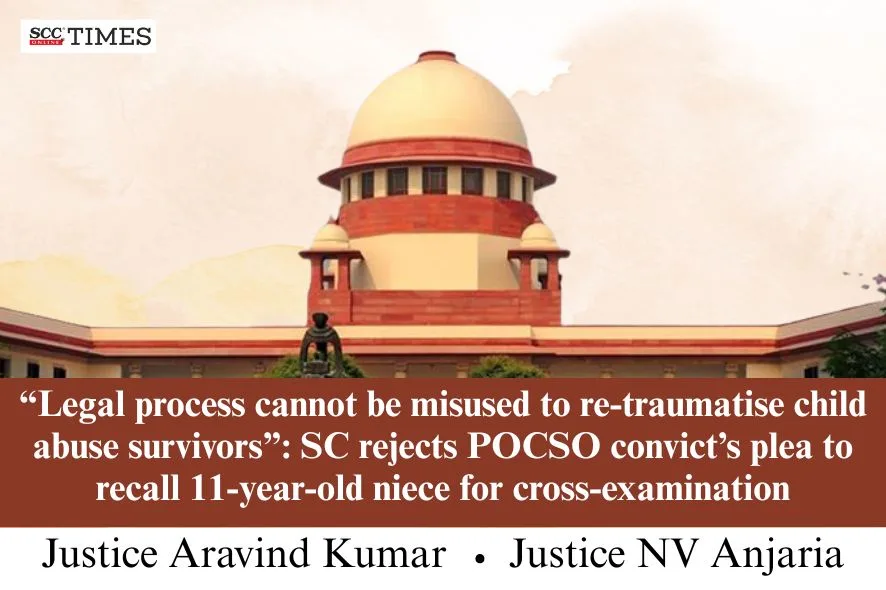Supreme Court: In an appeal filed by a man convicted under Section 6 of the Protection of Children from Sexual Offences Act, 2012 (‘POCSO Act’) for aggravated penetrative sexual assault on his 11-year-old niece, the division bench of Aravind Kumar and NV Anjaria, JJ. upheld the 20-year rigorous imprisonment sentence awarded by the Special POCSO Court and affirmed by the Gauhati High Court.
The Court further emphasised that courts must remain vigilant to ensure that procedural submissions are not misused as tactics for harassment. In strong terms, it held that requests to recall a child victim after the conclusion of trial and concurrent findings of guilt raise serious concerns, particularly when there is no manifest illegality or perversity in the appreciation of evidence.
The convict, who was the maternal uncle of the victim, was originally convicted in POCSO Case registered under Sections 376 and 506 of the Penal Code, 1860 (‘IPC’) read with Section 12 of the POCSO Act.
The main contention raised by the convict was that he was denied effective legal assistance during trial, as his defence counsel had failed to cross-examine the prosecutrix. Based on this, he sought a fresh opportunity to test her testimony.
However, the Court found no merit in the appeal. It noted that the victim, then a minor, had given a consistent and coherent statement under Section 164 of the Criminal Procedure Code, 1973 (‘CrPC’), which she reiterated before the Trial Court. Her version was corroborated by contemporaneous medical evidence confirming recent forcible sexual intercourse. Her age was conclusively established through her birth certificate, placing her below 12 years at the time of the incident.
The Court observed that the mere failure of the defence to cross-examine the prosecutrix did not vitiate the proceedings, especially in the absence of any objection or protest from the accused during the trial. No application for recall of the witness had been filed either on the day of her testimony or immediately thereafter.
Rejecting the contention regarding the delayed CFSL report, the Court noted that its findings did not exonerate the convict or contradict the consistent medical and oral evidence. To satisfy itself, the Court had called for the medical report, which clearly opined that the victim had been subjected to recent forceful sexual intercourse.
The Court strongly deprecated attempts to reopen the trial based on technical objections, especially in cases involving child sexual abuse. It emphasised that procedural lapses cannot be used as tactics for harassment and that recalling the child victim after the conclusion of a full-fledged trial would amount to secondary victimization.
The Court sternly cautioned against allowing technical pleas in cases involving grave offences such as child sexual abuse. It held that entertaining such pleas after the guilt has been established through a full-fledged trial and affirmed in appeal risks undermining public confidence in the administration of justice.
“Courts have a duty to ensure that survivors of child abuse are not re-traumatized by the very justice system they turn for protection”
Noting that both the Trial Court and the High Court had rendered concurrent findings based on cogent evidence, the Court held that no interference was warranted under Article 136 of the Constitution.
The Court stated that the legal process could not be allowed to become a means of perpetuating injustice under the guise of procedural lacunae. In matters involving sexual violence against children, the Court held that the paramount consideration was not the convenience of the accused, but rather the integrity of the victim’s testimony, the finality of lawful findings, and the need to prevent secondary victimisation.
It emphasised that once the trial had concluded and the victim’s testimony had been lawfully recorded, any attempt to recall the victim for re-examination had to be treated with extreme caution. In the absence of any compelling legal necessity, such requests could not be allowed. The Court further observed that such attempts must be discouraged, and where necessary, nipped in the bud, especially when they posed a risk of re-traumatising the victim.
Importantly, the Court expressed anguish over the fact that no compensation had been awarded to the victim by the lower courts. Invoking the constitutional obligation to provide meaningful redress, the Court directed the State of Arunachal Pradesh to pay ₹10,50,000/- as compensation to the victim. To safeguard her future interest, the amount was directed to be deposited in a fixed deposit for a period of five years in any nationalised bank, with the victim entitled to withdraw quarterly interest. The Member Secretary, Arunachal Pradesh State Legal Services Authority, was directed to monitor the process.
The Court reiterated that justice must go beyond conviction and include restitution wherever possible. It reaffirmed the judiciary’s constitutional commitment to protect the dignity and rights of child survivors.
Accordingly, the appeal was dismissed, with the Court finding no perversity or illegality in the concurrent findings of the courts below.
[Arjun Sonar v. State of Arunachal Pradesh, 2025 SCC OnLine SC 2065, decided on 09-09-2025]
Advocates who appeared in this case:
For Petitioner(s): Mr. Arjun Garg, AOR, Mr. Rajasmit Mondal, Adv., Ms. Sagun Srivastava, Adv., Mr. Saaransh Shukla, Adv.






